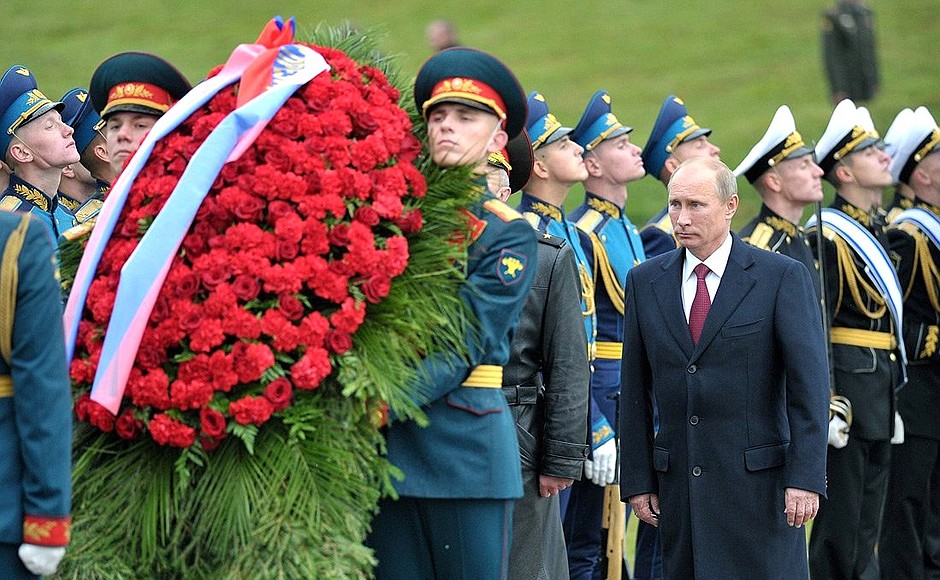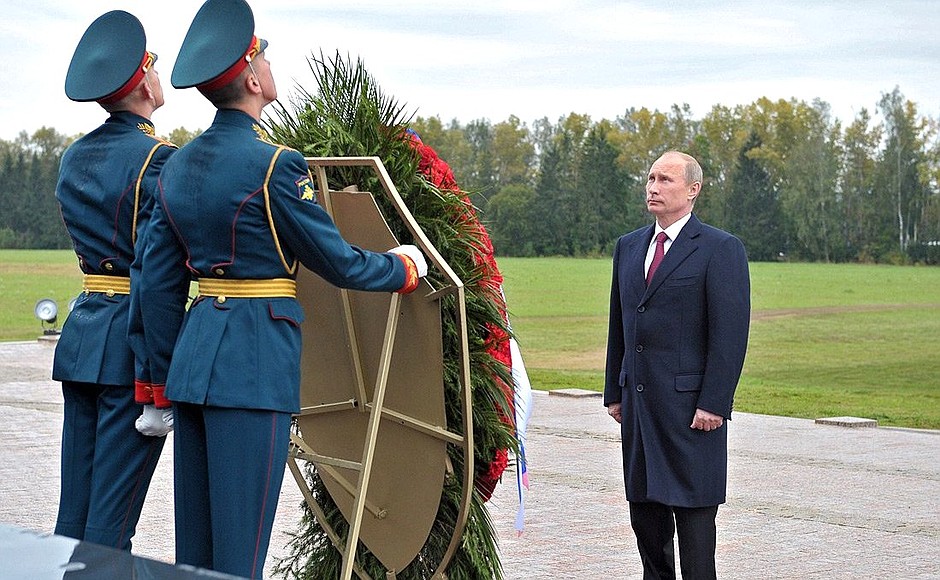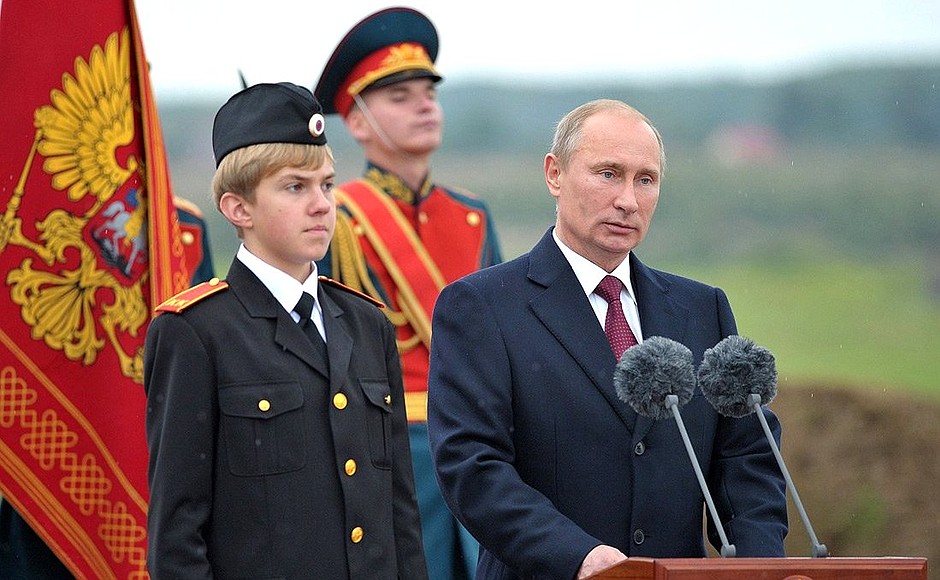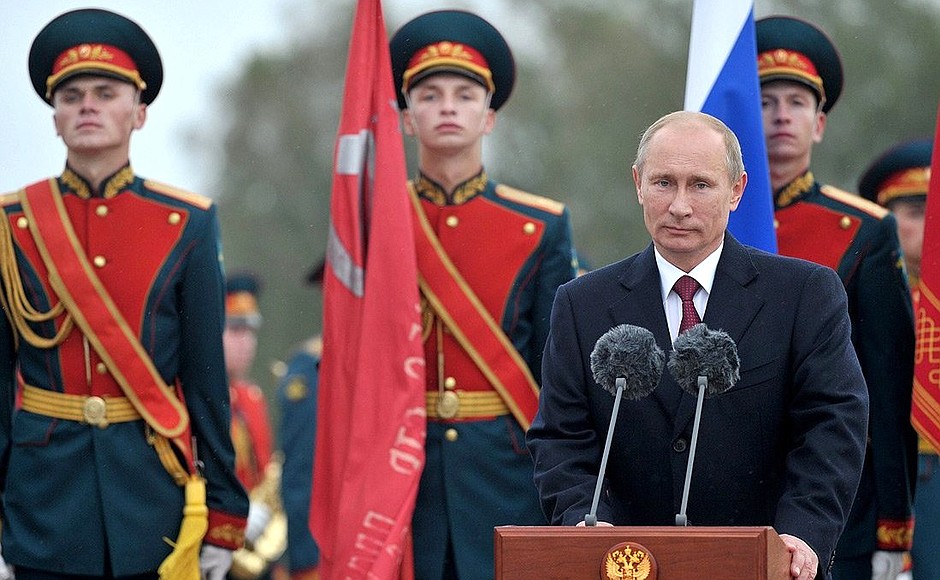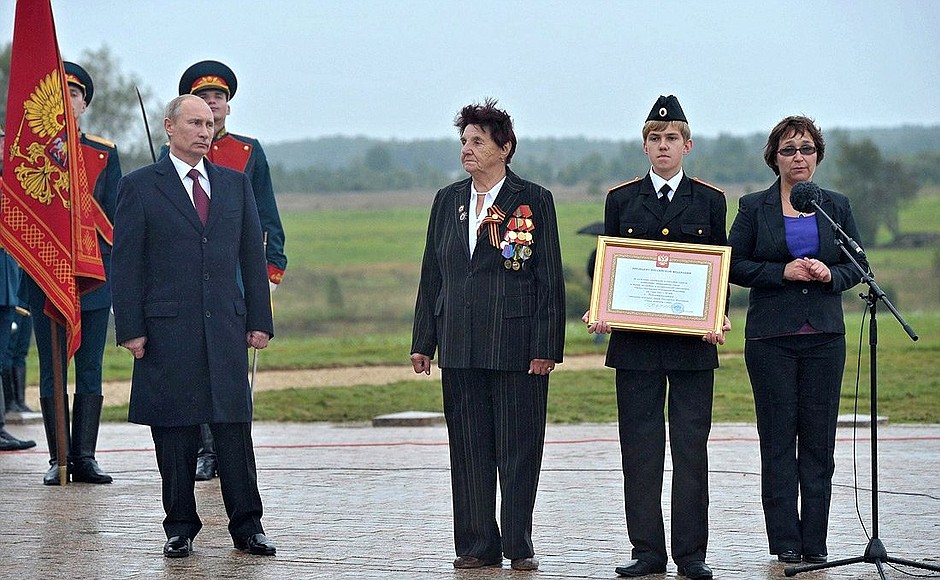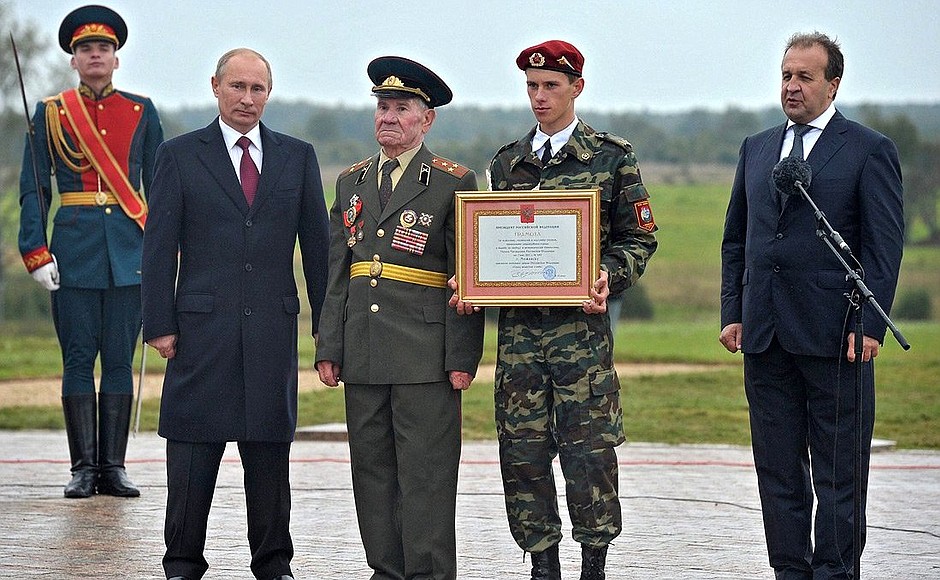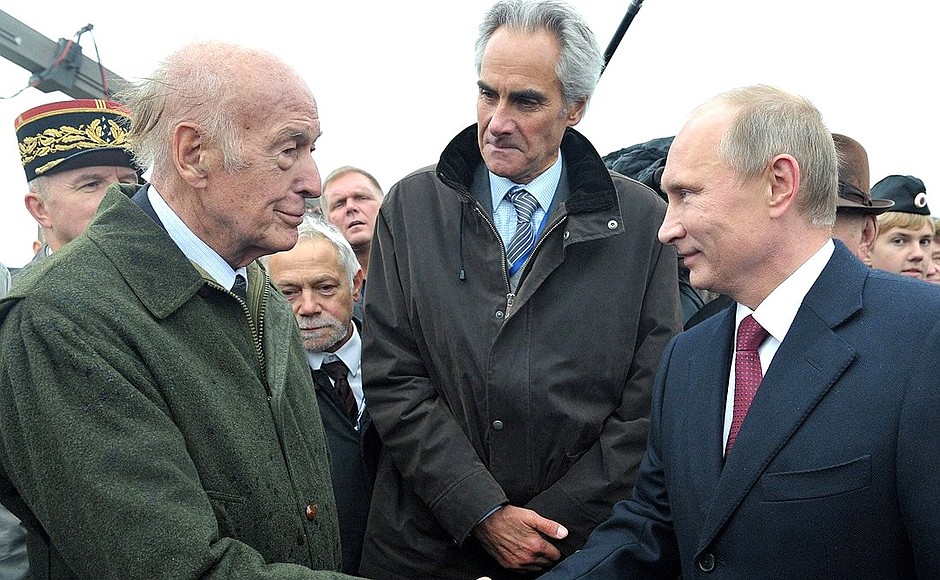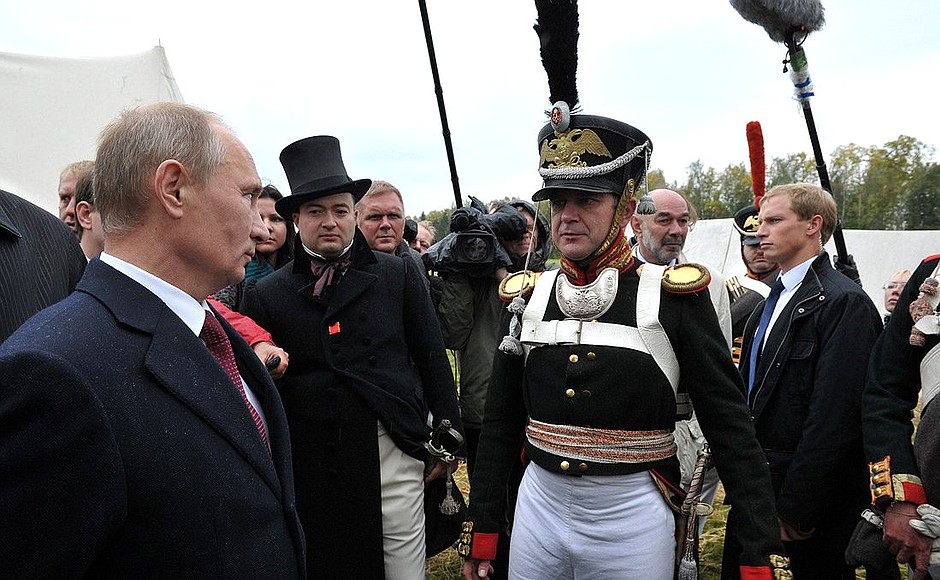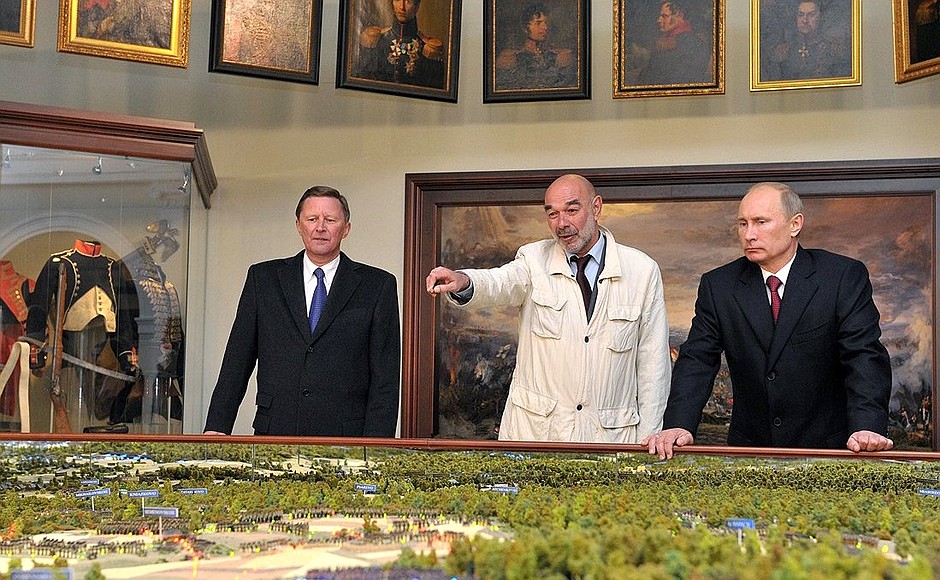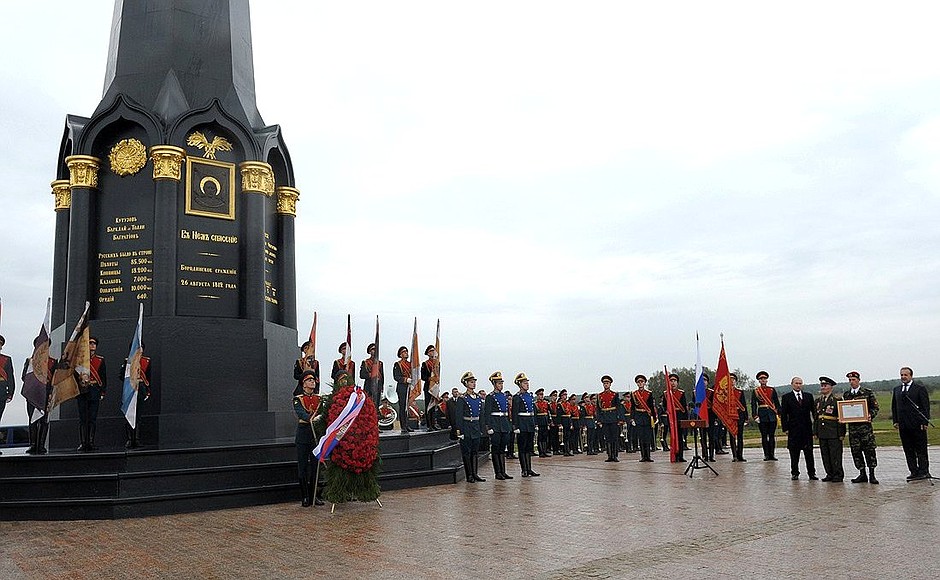The President laid a wreath at the main monument to Russia’s heroes of Borodino, and presented certificates conferring the City of Military Glory titles to representatives of Maloyaroslavets and Mozhaisk.
* * *
Speech at ceremony presenting the certificate conferring City of Military Glory title to Maloyaroslavets and Mozhaisk
President of Russia Vladimir Putin: Friends,
Our country has known many tragedies and wars throughout its history, but only two of those wars bear the name of ‘patriotic’, witnessing to the way in which they have left their indelible chronicles fixed in our national historical memory.
In both of these wars it was the fate of Russia, Europe, and the entire world that was at stake. We fought for our country’s freedom and independence and the entire people, from young to old, rose up to join this fight. The extraordinary courage, spiritual might, and selfless love towards their native soil that our people displayed in these battles filled the country with a strength hitherto unseen. To resist it was in vain, and to vanquish it impossible. The two patriotic wars remained forever in our history to attest to the exceptional patriotism of our people, who defended their country and made it a great world power.
Today we are on the sacred ground of Borodino field, where the main battle of 1812 took place 200 years ago. Russia’s great patriot and military commander Mikhail Kutuzov called this battle “an eternal monument to the bravery and courage of Russia’s soldiers”.
We know our history well and we know that neither side won a decisive victory in this battle. Indeed, the Russian army decided to make a temporary tactical retreat in order to ensure their subsequent victory. But we will never forget that “only the dead did not get up from the ground” at Borodino, and that this battle changed the war’s course and became its moral turning point. After this it became truly a people’s war and it was clear that the invaders would never vanquish Russia.
It was here that the future of Europe and its peoples was decided, and that Kutuzov, Barklay-de-Tolly, Rayevsky, the Tuchkov brothers, Vorontsov, Neverovsky, Konovnitsyn, Platov, Uvarov, Davydov and many other sons of Russia brought glory to their names. They have handed down to us through the generations their noble devotion to their Fatherland and the sense of pride to be its defender.
Two centuries have passed since then, but the heroes of Borodino, people of different social backgrounds and ranks, continue to win our admiration and reverence. Each and every one of them helped to save our country. Thousands of them are buried here in this sacred ground.
Among them is Prince Pyotr Bagration, one of the people’s most beloved commanders. He was distinguished by his incredible courage and valour, took part in 20 campaigns and 150 battles, and gave his life for Russia, his Motherland. His name was given to a successful operation our troops conducted during the Great Patriotic War, which liberated Belarus and part of Lithuania and Poland.
The events of 1812 unite people in Russia and in all of the countries that went through the trials of war in those years and were drawn into the military campaigns. They serve as a lesson and are not cause for enmity or misunderstanding. On the contrary, only by trusting each other can we stand against the modern threats we face today. I share the firm conviction that true reconciliation and respect for the past, respect for our common history, for our forebears’ courage, and for the honour and bravery of the soldiers who did their duty are a solid foundation upon which we can build genuinely friendly relations between countries and peoples.
I must say today, that the monument to the French soldiers that our forebears erected to mark the 100th anniversary of Russia’s victory in the 1812 Patriotic War is a mark of their noble hearts.
Friends, it is symbolic that here, where the “Russians earned the right to be unvanquished”, the towns of Maloyaroslavets and Mozhaisk are being conferred the title of City of Military Glory. They are receiving these titles to honour the feats of their residents and defenders during both Patriotic Wars.
Napoleon’s plans to reach Kaluga by crossing areas so far spared by war and take hold of large stores of supplies were thwarted at Maloyaroslavets. Without hope of making peace with Russia, Napoleon left Moscow still unvanquished and encountered our troops’ fierce resistance outside Maloyaroslavets. Our troops blocked all roads leading to the south and southwest. A fierce battle went on for 18 hours. Let me remind you that the battle here at Borodino lasted 15 hours. In its intensity the battle at Maloyaroslavets was similar to Borodino and became one of the key events in the 1812 war. This little town, the very name of which rings proud with the word ‘slava’ [glory], stopped Napoleon’s great army from going any farther and became the point from which their retreat and final demise began.
Maloyaroslavets celebrated its 600th anniversary 10 years ago. Its rich history also contains many heroic pages from the Great Patriotic War. It was here that the Podolsk Military Academy cadets’ battalions fought and made their names immortal. The town was occupied [by the Nazis] in the autumn of 1941, but did not surrender. Its residents organised underground groups and partisan detachments in a staunch resistance similar to that of 100 years earlier, in 1812, when people’s partisan groups also played a big part.
The ancient town of Mozhaisk also deservedly receives the title of City of Military Glory today. Mozhaisk was an advance post on the western borders of the Muscovy Principality and a pillar the authorities could rely on in the process of gathering and uniting the Russian lands. For centuries it was an unassailable fortress on the Smolensk road.
The town’s heroic fate reflects the events of both Patriotic Wars. The [Russian] forces that took part in the battle of Borodino gathered here, and in the summer of 1941, the Mozhaisk defence line was put in place and bore a fierce Nazi attack. The fierce fighting that took place that autumn, including here, at Borodino field, slowed the Nazi advance on Moscow, enabling our troops to launch a counteroffensive by the time December came.
All who took part in the battles around Moscow lived up to the glory of their forebears and made their valour shine even greater as they defended our capital. Everyone in Maloyaroslavets and Mozhaisk remembers these immortal feats in the name of our homeland.
I congratulate the residents of these towns on receiving the title of City of Military Glory.
Let us begin the ceremony.
<…>
Friends, I congratulate once more from all my heart the people of Maloyaroslavets and Mozhaisk on receiving the title of City of Military Glory.
It is symbolic that the title certificates were received not only by veterans’ representatives but also by representatives of youth organisations, for it is young people who are now continuing the deeds that our forebears began to develop our country.
This ceremony takes place as we mark the 200th anniversary of the battle of Borodino. Each of us feels something special here on this sacred ground of Russia’s military glory, and this is more than just the penetrating and vivid sense of being in contact with our great historic past. The biggest feeling is that of pride in our ancestors, pride in their great deeds and self-sacrificing spirit, the kind of pride that gives us the strength we need to work for our country and its prosperity.
Let me say once more that events such as today’s do not seek simply to commemorate bloody events of the past, but provide a good occasion for thinking about how to build relations with our neighbours and friends today in the common European home and talk about how to build a common future together. The words that the Russians “earned the right to be unvanquished” at Borodino were quoted before, and Napoleon also said that the French showed that they can be victors. Today, we all should join ranks and work as one to build our common European home.
But of course we in Russia must never forget our own country, its development and future, and so I want to stress once again the simple words that only when our peoples united and stood together did they obtain the greatest results in developing their homeland. All in all, unity – the unity of our people – is what patriotism is all about, and it is this patriotism that has always been the basis of all our great victories. As our anthem says, “it has always been this way and always will be!”
Thank you very much. Congratulations!
